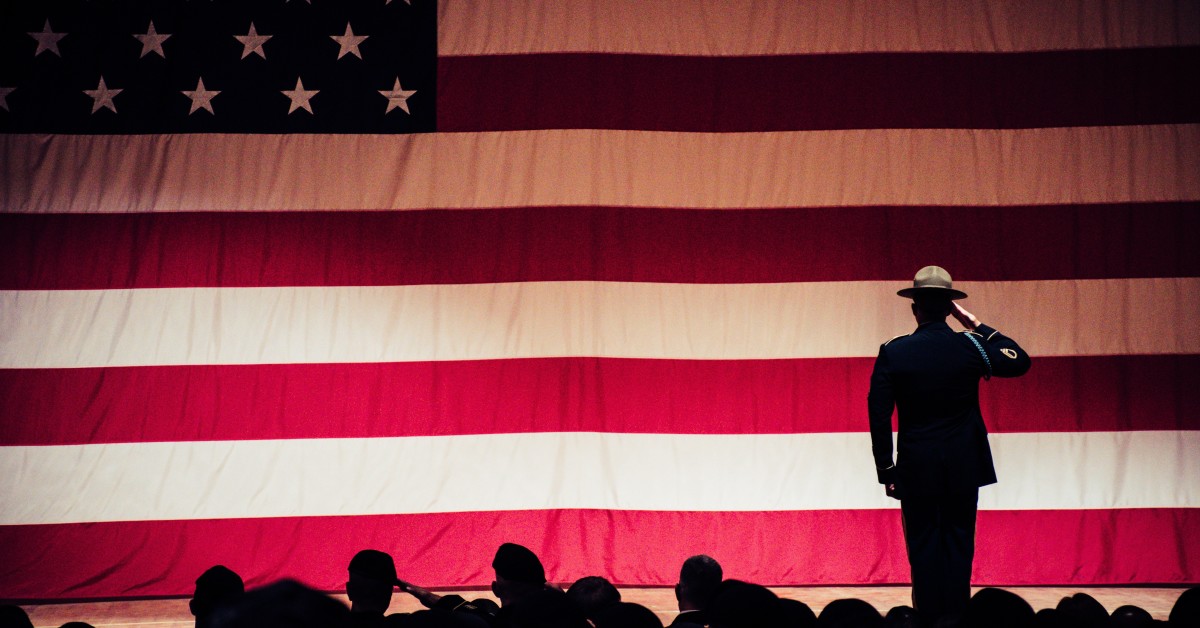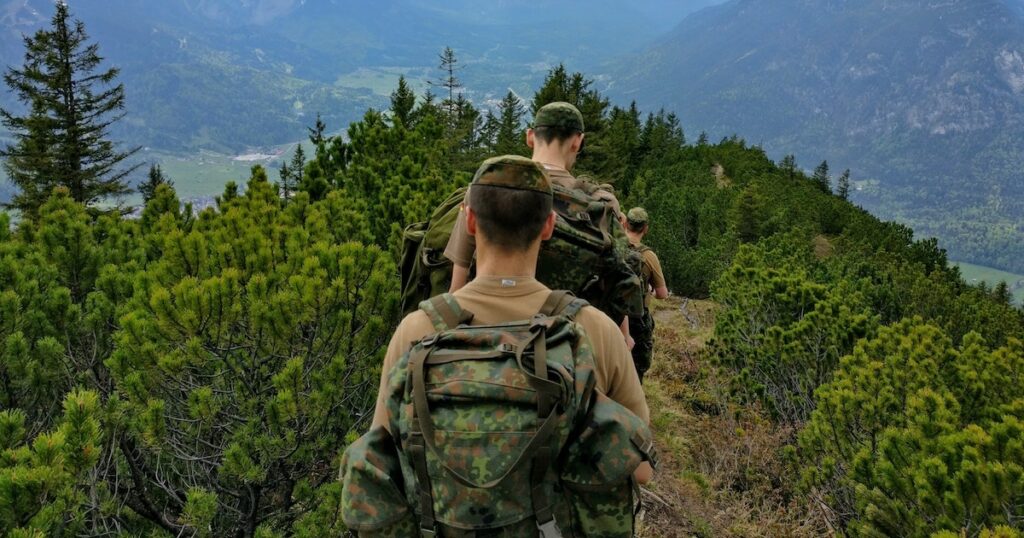
The 9 Best Master's Degrees for Military Officers
The military needs experts in business administration, cybersecurity, data science, [...]

Not all Army personnel are infantry (just as not everyone at Microsoft is a software engineer). Like any vast enterprise, the United States military employs all kinds of professionals, from financial managers to dietitians to entomologists.
Those professionals include social workers. As an Army social worker, you become an officer in the Army Medical Service Corps, and you work with people whose concerns and needs can be very different than those of the general population. You also have access to some of the most up-to-date healthcare and health services treatment and technology. Your duties may include research, teaching, and assisting with policy development (in addition to client services).
If you’d like to get into social work but aren’t sure where to start, consider a career in the armed forces. When you become an Army social worker, you may qualify for student loan repayment under the Health Professionals Loan Repayment Program—and you may receive a big enlistment bonus. You might even learn to shoot a rifle.
In this article, we’ll cover:
The Army first commissioned social workers in July of 1945. Today, every branch of service employs active duty and civilian-military social workers, deploying them anywhere soldiers are stationed and veterans are served. Many of these social workers are employed by the Army. Many others serve with the Department of Veterans Affairs. Others work for the Navy, Air Force, or Marines.
Army social workers work in the following situations:
Regardless of where they work, their job is the same: to help active and off-duty service members and military families lead healthier personal lives, to help soldiers recover from traumatic experiences, and to support those transitioning to civilian life.
| University and Program Name | Learn More |
|
Merrimack College:
Master of Science in Clinical Mental Health Counseling
|
|
|
Virginia Commonwealth University:
Online Master of Social Work
|
Military members face many of the same challenges as civilians, but also other issues stemming from Army culture and their unique experiences as soldiers. As a result, military social work is a specialized field of practice. Army social workers work with military personnel, veterans, spouses, and dependents. They need to be prepared not only to help their clients through personal and financial difficulties, but also to counsel them through the stress of deployment, conduct critical event debriefings, and care for those with post-traumatic stress disorder (PTSD).
Army social workers need to have a deep understanding of:
Army social workers’ duties may include:
Some Army social workers specialize further and work in family advocacy, alcohol- and substance-abuse treatment, medical social work, pediatric social work, domestic violence social work, and other niche areas. You may receive this training in a master’s degree program or in Advanced Individual Training (AIT) given through the Army’s Medical Service Corps. Advance opportunities typically involve oversight of departments in the role of director or chief.
To become an Army social worker, you will need your Master of Social Work (MSW) from a program that is accredited by the Council on Social Work Education (CSWE). The Army will only commission you if you’re a fully licensed social worker with a graduate degree.
First, though, you need to earn your bachelor’s degree. Many social workers choose a bachelor’s degree major relevant to the job (such as counseling, sociology, psychology, or social work). If you choose to pursue a Bachelor of Social Work (BSW) degree, you’ll likely need to complete a supervised clinical social work internship to graduate. It’s worth looking into internships on military bases or in an armed forces clinic because that will give you a better idea of what becoming an Army social worker is all about.
After you complete your BSW (or another appropriate undergraduate degree), your next step will be to enroll in a master’s degree program. Army social workers come from different kinds of MSW programs and choose all kinds of concentrations, but note that some schools offer specialized military-focused Master of Social Work programs.
__The following universities have MSW programs with military social work concentrations (or similar):__
Choosing one of these programs or a military-focused program at another school is the best way to prepare for a career working with service members, their families, and veterans. Accredited MSW programs with concentrations or sub-concentrations in military social work cover core topics like:
They also take classes like:
By choosing a specialized military-focused program, you may increase your opportunities to complete your field placement with a military population. That’s a huge plus. However, even if you don’t earn your MSW in a program that offers a military concentration, your program’s field coordinator may be able to find placements in military-affiliated support centers, retirement communities, substance abuse clinics, or health centers. You may still be able to work with military personnel and veterans.
If you’re already serving in the armed forces, Fayetteville State University offers master’s degrees in social work to active duty soldiers as part of a partnership with the Army. Note that FSU also has a military behavioral health graduate certificate program.
As an Army social worker, you’ll not only need to pass the Association of Social Work Board’s (ASWB) exams to become a Licensed Master of Social Work (often abbreviated as LMSW, LGSW, or LSW), but you will also earn additional credentials.
__The National Association of Social Workers (NASW) offers three additional certifications for military social workers:__
The MVF-CSW and MVF-ASW designations are available only to those who have completed the MSW degree and three years of professional military-focused social work. To maintain these certifications, you will need to fulfill a continuing education requirement. Luckily, the Army offers its social workers plenty of professional growth opportunities, including courses, conferences, and seminars, along with free access to doctoral programs.
Army social workers are commissioned officers in the service’s Medical Service Corps, which means that pay is based on rank. According to Glassdoor, the typical Army social worker’s salary is $53,975, though an Army social worker who is a captain might earn more. A lieutenant colonel will make a lot more. Money isn’t the benefit of becoming an Army social worker, however.
Military social workers enjoy benefits like:
To become an Army social worker, you will need to enlist by the age of 42 (although you can request an age waiver if you’re joining the reserves). You must also be a US citizen. You also need to know that Army life typically requires frequent relocation. As a member of the Army Medical Service Corps, you’ll be assigned wherever the Army needs you, doing whatever the Army needs you to do. You might work in a military hospital in Florida, a substance abuse treatment program in Illinois, or a family counseling practice in Bangkok.
In short, you won’t have as much control over your career as you would if you become a social worker in private practice setting. If you’re unsure you can handle the regimen, reach out to some Army social workers to ask if you can shadow them for a while. Also, make an appointment to talk to a medical recruiter about the various benefits and commitments of enlisting as a social worker.
If you’re thinking about becoming an Army social worker to capitalize on the loan repayment benefits, residency programs, and medical insurance, fine, but remember that there are downsides to this career choice. You could be deployed overseas to a place you wouldn’t choose to visit on your own. You may be sent on extended training missions that last for weeks or even months. You will be required to participate in combat-specific training like marksmanship. At best, military life is rough on families.
If none of that dissuades you, here’s some good news. In 2010 the CSWE wrote: “There is an urgent need to understand and engage with the military service members, veterans, their families, and their communities in effective social work practices.” That hasn’t changed. Military life will always be stressful and there will always be war, which means you can be sure you’re making a real difference in the lives of the people who protect our country when you choose this career.
(Last Updated on February 26, 2024)
Questions or feedback? Email editor@noodle.com

The military needs experts in business administration, cybersecurity, data science, [...]

You don't need to get your MSW in Louisiana to [...]

There are many different kinds of behavioral therapists. They share [...]

A career as a social service manager entails a lot [...]

A Master of Social Work (MSW) offers a pathway to [...]
Categorized as: Counseling, Social Work, Social Work & Counseling & Psychology